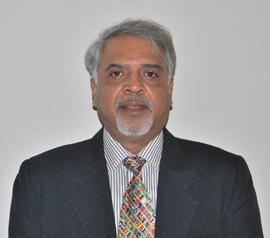Awareness of IPC standards is on steady rise in Indian Electronics industry. As India doesn’t have its own authentic standards for electronics hardware, IPC India has a significant role to play in Indian EMS industry in upgrading the quality and reliability of their product, by creating awareness of IPC Standards and offering training & certifications at affordable prices.
Two key persons Mr. David Bergman, Vice President, International Relations, IPC and Mr. Akshinthala Vijayendra, Managing Director, IPC India spoke to EM bout the organization activities and support for Indian electronics fraternity.


Vice President,
International Relations, IPC
1. How is IPC organization performing for the promotion of Indian electronics industry?
IPC and our local India operation (IPC India) have been delivering direct service to the Indian electronics manufacturing industry since 2007. IPC’s goal with all our members is to work towards the financial success of our members worldwide. We have been very active in bringing i) IPC standards to support Indian electronics manufacture ii) global training programs on our most popular standards as well as iii) management training for key positions in electronics assembly companies. As India doesn’t have its own authentic standards for electronics hardware, IPC India has a significant role to play in Indian EMS industry in upgrading the quality and reliability of their product, by creating awareness of IPC Standards and offering training & certifications at affordable prices. In addition, local demand by Indian industry encouraged us to develop unique offerings for the Indian market including programs for fresh employees, rental programs for IPC educational videos etc.,. These unique offerings were developed by IPC India specifically at the request of Indian companies and these are not offered outside of India. We still have much more to do in popularizing the IPC standards amongst Indian MSMEs to give a tough competition to global counterparts.
2. Can you share your venture and experience with IPC and what are your key roles for the organization growth?
IPC India was established with seed money from IPC USA in 2010. Since inception with original seed money injected, IPC India has registered its presence not only amongst the EMS industry in India but also OEMs, Aerospace industry , Defense production, wire harness & cable assembly, PCB designers and service sector industry etc., We continue to successfully grow through the development of services to our member companies in India which now number over 90. We provide significant service through the local sales of IPC standards and delivery of training programs. Over and above this prime objective, we also relentlessly work towards chalking out new activities & services that benefit the budding entrepreneurs of Indian electronics industry as IPC is basically member driven non-profit organization.
3. What is your outlook on Indian electronics industry growth and key drivers?
Growth of the Indian electronics industry lies in the coordinated efforts of Manufacturers, Law makers and proactive Government policies. This helps in bringing out reliable quality products at competent prices on par with better placed companies from across the border. Compliance and adherence to industry accepted standards of global consensus is the prime factor that effects the quality and reliability of a product and thus growth from Manufacturer’s end. Key driver to achieve this would be technical education through periodical trainings and knowledge sharing. IPC India is working on these lines by creating awareness on IPC Standards and regularly conducting training & certification programs, seminars and workshops etc.
4. What big challenges you are looking that really need to be tackle for overall industry growth?
i) Training the abundantly available young Indian man power to “Skilled Technicians”
ii) Directional & focused approach to catch up with advanced technology and manufacturing techniques. This needs to be supplemented by thorough knowledge on contemporary methods and R&D facilities to aim for constant improvement from concept to end product level.
iii) And not the least, Government initiatives and positive measures in formulating industry friendly legislations. This not only encourages the local manufacturers in handling things independently at par with global standards and prices but also brings in more joint ventures with established MNCs that are looking forward to invest in India.
5. What do you think about “Make in India” initiative by Indian Government?
A novel objective of national importance that needs to be chased with the collective effort of all as mentioned above. India has the most intellectual minds that generate the most innovative ideas in any given area. Tapping this intellect in the right way to progress; commitment by the Indian electronics industry ; commitment by the government to facilitate the initiative and time are the factors that contribute to the success of this initiative & campaign in the days to come.
6. Why standards and how IPC standards is encouraging the industry meeting the performance?
Standards are intended to form a common language between the customer and their supplier irrespective of their location globally. Clear understanding of IPC standards globally and proper usage of this knowledge enables both sides to save money and be more successful. Calling out of IPC standards on purchase orders speeds the process of communicating customer needs. IPC formed a local task group for companies in India to participate in IPC’s global standardization process. The growth of this was amazing with over 250 delegates participating in a standards discussion meeting in Bangalore in May 2014. Volunteers from Indian companies came forward to chair some of the individual committees and detailed comments on behalf of Indian industry were submitted to the global standardization committees. I believe this augurs well for the future, as IPC standards are used everywhere and with industry in India very involved in this process, these companies will be influential and completely informed about any changes or updates that take place.
7. What are the recent activities of IPC you would like to highlight and what are your support?
IPC India essentially works on the need based issues connecting the Electronics Manufacturers in India . In this connection, a technical advisory committee (TAC) has recently been formed for 2015 with industry experts. The TAC will help to make sure that the programs developed by IPC India will most effectively support the companies in India. These industry experts will meet several times a year and provide continuing feedback and these TAC recommendations pertaining to different sectors of Electronics Manufacturing will be implemented. Process Validation and Product Audits are key issues addressed by IPC in India in addition to localizing IPC standards/ customized Training, and DVD rentals, which is a step towards meeting our objective to make IPC products cost effective. In fact, these effective, beneficial, industry friendly programs have brought many an Indian company to IPC fold.
The TAC has already provided feedback that will help us organize IPC events one around June in Bangalore which will be focused on workshop educational opportunities. This event will be designated NCEDAR and is scheduled currently for the beginning of June. The second event will be held in Delhi in September in conjunction with electronica India and productronica India 2015. IPC India will organize a technical conference during this period as well as additional educational workshops. And since electronica India & productronica India is a tradeshow, IPC India is organizing a pavilion to support our members and their desire for commercial endeavors. As competitions have become an integral part of our technical events, IPC Hand Soldering Competition is being held during this event. PCB Design contest too is being planned.
8. What are your promotional activities to encourage member participation and spread awareness?
IPC India puts out a monthly e-newsletter which keeps members and industry up to date on programs being developed locally. We have our presence on social media such as LinkedIn, Facebook & You tube and we have partnered with our sponsors and members to help spread the word on IPC programs.
Further, we thankfully acknowledge that industry too contributes to creating awareness of IPC Standards as many companies have sponsored their employees for our training & certification programs as per their vendor’s requirement and the saga continues.
9. What are the advantages of your training, programs and certifications offering for electronics fraternity?
IPC training and certification programs are a local delivered offering of a global training and certification operation. All of these programs have traceability back to IPC headquarters and are taught by highly experienced master instructors. These programs help prepare Indian manufacturers to be able to manufacture to the expectations of a global export customer base. These trainings have international acceptance and the standard is uniformly maintained all over the world. Any global company operating in India would naturally be aware about IPC training and would prefer to go in for it for training their personnel.
10. What else you would you like to share with our readers who are electronics enthusiastic?
IPC USA has been in existence for over 57 years. IPC India has only been in existence for above four years. Yet, ideas for new programs in support of electronics manufacturing have already come out of Indian industry and have been embraced by the global IPC operation. An excellent example of this is regarding validation. Local companies reached out to IPC India requesting support to verify that their product meets IPC’s global standards. In addition, many companies asked IPC about the possibility of an assessment to ensure that the companies were manufacturing in accordance with the IPC standards. Both of these local demands in India have influenced the direction of the IPC organization to provide validation services in other parts of the world. So India in this case provided the seed of the idea which has now grown into the global program. We look forward to continuing to listen to the customers in India, help them be financially successful and develop programs that can be rolled out in support of the global manufacturing industry.






